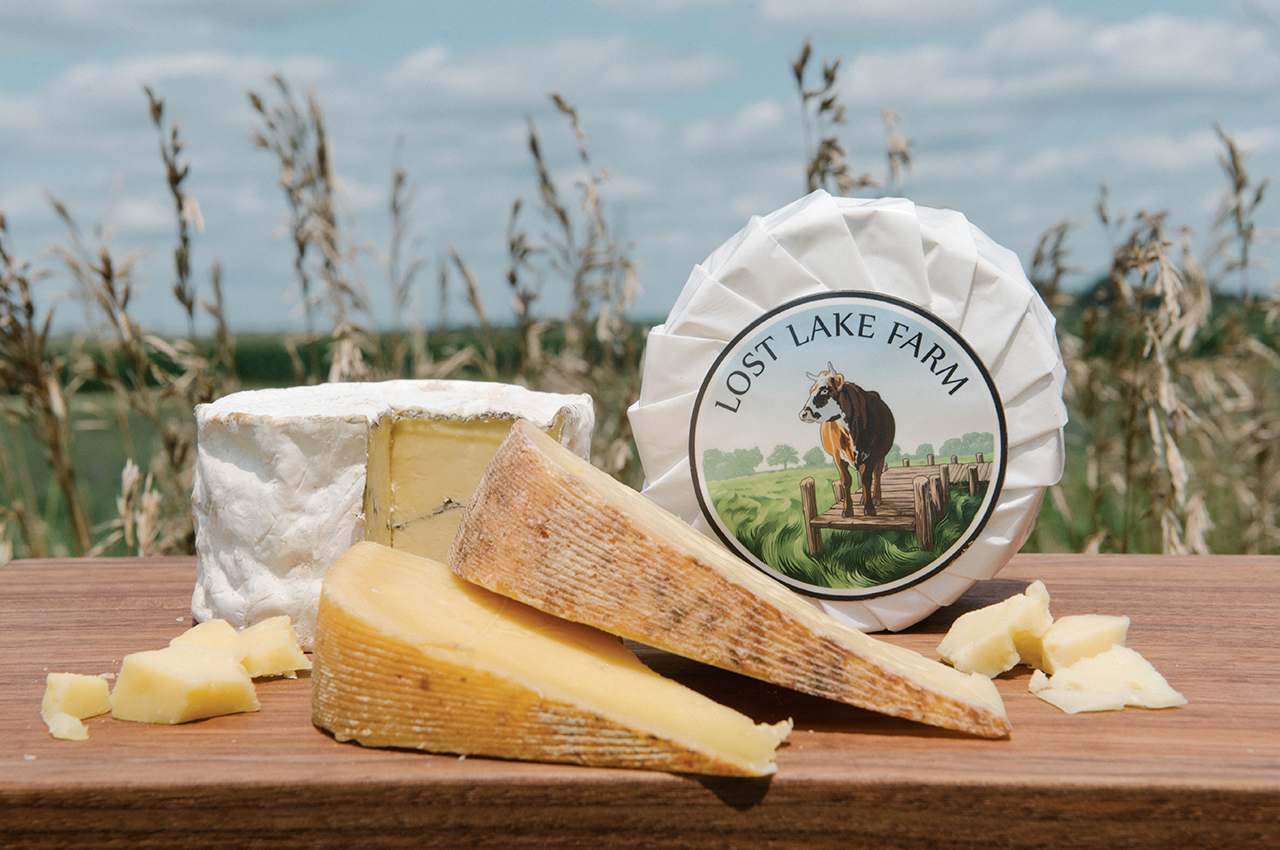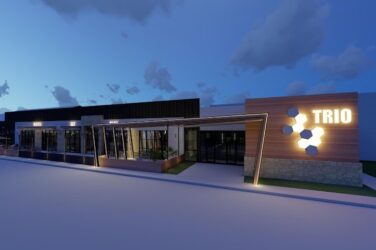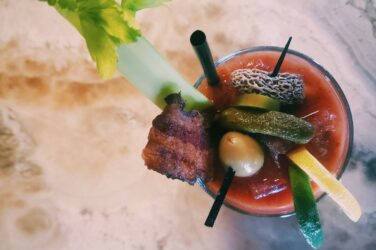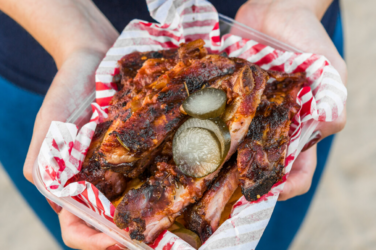Lost Lake Farm makes small batches of various soft and firm cheeses, including Iowa Alpine (front) and Burrnt Oak (unwrapped in the back). Find their flavor profiles below.
Writer: Mary Jane Miller
Photographer: Joelle Blanchard
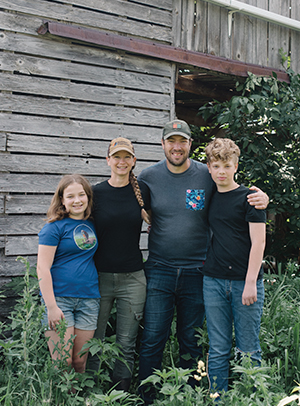
Corn and soybean fields surround the lush regenerative pastures of Lost Lake Farm a mile northwest of Jewell. An unassuming white house sits across the drive from the milking parlor and barn-red building that houses the cheesemaking and aging rooms.
Kevin and Ranae Dietzel bought the place in 2012 and earned a license to sell their cheeses in 2016. They tend a mixed herd of dairy cows, pigs and two children. Kevin is the cheesemaker but shares all the other farm duties with Ranae, who works mostly from home as a data research scientist for Syngenta. The kids, Scarlett and Sterling, have plenty of chores, and Ranae’s parents help at the farmers market in Ames. Sadie the dog is there for moral support.
Kevin makes the cheeses on site in a spotless modern room, turning out everything from nutty, semi-hard Iowa Alpine cheese to spreadable, whole-milk quark. The Minnesota native studied biodynamic farming in Germany and, after three years of work and two days of grueling tests, became a state-certified agriculturalist (or, as they say over there, a “staatlich anerkannter Landwirt”). Back in the States, he earned a biology degree from the University of Minnesota at Morris, where he met Ranae and married her in 2006.
When Ranae was studying for her master’s degree at Cornell University, they lived on an acreage and bought their first cow, Honey. (It sounds like a fairy tale, but that’s how their cheesemaking started.) Honey produced more milk than the two of them needed, so Kevin started learning how to make cheese. Eventually, Ranae’s doctoral studies in soil health brought them to Iowa State University and closer to Ranae’s parents.
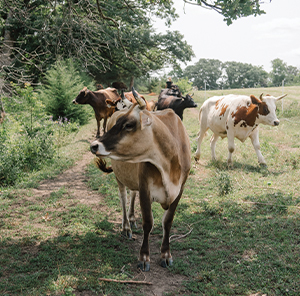 The Dietzels have dedicated their academic lives and careers to studying the soil, and their pastures are living proof of their care. Better forage makes healthier cows, which produce higher-quality milk. The Lost Lake Farm pastures are a mix of perennial grasses, alfalfa and clover, where Kevin, out for a stroll, will occasionally stop and turn over a cow patty to “see what’s going on underneath.” When the cows are let loose in new pasture, they nibble first on what they like best. They’re moved to fresh grass at least once a day, so the fields are never grazed to the ground.
The Dietzels have dedicated their academic lives and careers to studying the soil, and their pastures are living proof of their care. Better forage makes healthier cows, which produce higher-quality milk. The Lost Lake Farm pastures are a mix of perennial grasses, alfalfa and clover, where Kevin, out for a stroll, will occasionally stop and turn over a cow patty to “see what’s going on underneath.” When the cows are let loose in new pasture, they nibble first on what they like best. They’re moved to fresh grass at least once a day, so the fields are never grazed to the ground.
The Dietzels gave their first Iowa cows Norwegian names, like Ingrid. But in recent years, the names have annually shifted one country to the south, and the name of each calf starts with the first letter of its mother’s name. So last year, when the names came from Turkey, Bibi gave birth to Breyza. Now the herd of 22 includes Kismet, Melek, Brioni and Goezirl, to name just a few.
When it’s milking time, they all know the way, and the “herd mentality” is strong. If a cow wanders off even for a few minutes, it’s visibly uncomfortable. The rest of the herd stops and looks at the wayward cow in a disapproving way. But when they reunite, they’re frisky and playful. They line up to go into the milking parlor like patrons entering a spa.
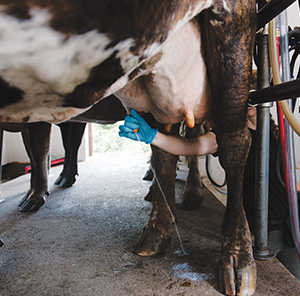 Kevin crafts delicious European-style semi-hard cheeses in big wheels that are cut and sold in wedges. Their flavor is fullest at room temperature, but the Emmentaler melts beautifully, resulting in an enhanced nutty flavor and a nice stringy pull. The Iowa Alpine is lovely heated, too. The cheese keeps its shape and softens; the heat brings out its pleasant sharpness.
Kevin crafts delicious European-style semi-hard cheeses in big wheels that are cut and sold in wedges. Their flavor is fullest at room temperature, but the Emmentaler melts beautifully, resulting in an enhanced nutty flavor and a nice stringy pull. The Iowa Alpine is lovely heated, too. The cheese keeps its shape and softens; the heat brings out its pleasant sharpness.
The soft cheeses have won over fans, too. “No one else in Iowa is making such good soft cheeses,” said chef Suman Hoque, who owns HoQ restaurant in Des Moines’ East Village and uses the Lost Lake Blue and the Camembert-like Burrnt Oak on cheese plates. He also tucks the slightly funky blue into olives to garnish his martinis and stuffs mozzarella into peppers for chiles rellenos.
Besides cheese, the beef from Lost Lake Farm’s older dairy cows has a rich complex flavor, like fine red wine or whiskey. The fat is butter yellow with a flavor to match. The farm’s pigs are fed a mash of whey left from the cheesemaking and grains, resulting in pork that is both flavorful and juicy. The pork fat even carries some of the nutty flavor of the cheese.
Lost Lake Farm cheeses are available online or in person at the Saturday farmers markets in Ames and Des Moines. You can order quarters or halves of beef and pork online for pickup at the Stanhope Locker and Market.
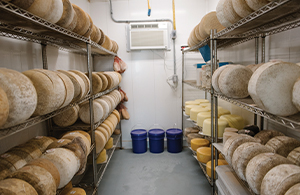
At Lost Lake Farm, aging is a virtue.
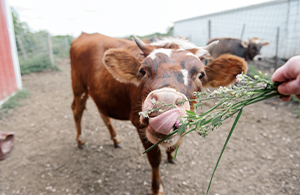
Bovine beauty queen Sheba enjoys her daily dose of leafy greens.
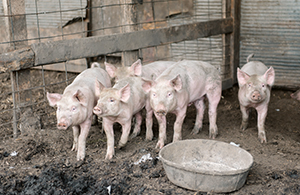
The Lost Lake Farm cows have company, like these five piglets.
Lost Lake Farm’s most popular cheeses
Iowa Alpine: The best-selling Lost Lake Farm cheese is sharp and semihard, similar to Gruyere or aged Tomme. It’s great for slicing for crackers or sandwiches. Serve it with a dry Riesling, pilsner or fresh cider.
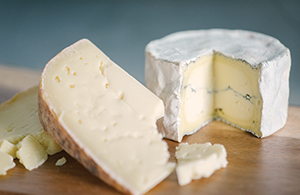
Emmentaler: Lacy holes perforate the pale cream-colored Swiss-style cheese with a mild nutty flavor that intensifies with melting. Serve it with a Belgian-style sour ale, a fruity white wine like pinot grigio or a seltzer with lemon.
Cheddar: This pale yellow cheese with a black wax rind is both creamy and sharp even when young. Serve it with a mild beer, robust white wine like chardonnay or black tea.
Farmstead Feta: This salt-brined cheese is crumbly on the inside and lusciously creamy on the outside. The mild grassy flavor stands out on salads, softened on top of grilled or roasted vegetables, or all on its own. Serve with sauvignon blanc, green tea or hard cider.
Lost Lake Blue: This unique delicious blue cheese is made from Camembert inoculated with Roquefort culture. It starts out mild and rich but sharpens with age, similar to Cambozola. Drizzle it with honey or enjoy it with charcuterie, dried fruit and olives. Serve with a dark beer or lighter red wine like pinot noir.
Camembert: This cheese has a pretty white bloom on the outside, a gooey center and a mild mushroomy flavor. Its buttery and slightly bitter notes pair well with sweet jam or honey. Serve it with white wine, wheat beer or fresh-pressed cider.
Burrnt Oak: The Camembert curds have a layer of ash from one of the farm’s 200-year-old burr oak trees. It’s a mellower version of the Camembert but still has a complex mushroom perfume.
Quark: This is a soft, farmer-style cheese, which chef Suman Hoque of HoQ restaurant in Des Moines likens to a nice chevre but richer. Its buttery, mild flavor pairs well with berries, chives and garlic. And it’s great to bake into a cheesecake; use it like cream cheese.


